Charles Stuart Harris
Charles Stuart Harris, a London firm of silversmiths, started in 1817 by John Mark Harris as a producer of silver spoons and forks, and developed into a major manufacturer of silver and plated wares at home and abroad by the 1870s. Tt seems that the business was continued by John Robert Harris, probably John Mark Harris’s son. In 1843 he moved the business to larger premises in Hatton Garden, London where he stayed until 1852.
In 1852 the business passed to Charles Stuart Harris, who was registered as an electro spoon and fork maker, electro plater and gilder and manufacturer of plated wares and, most importantly, a silversmith. The company was registered in his name in 1881, and expanded into salvers and tea trays, tea and coffee services, cups, bowls, dinner wares, and condiment sets. Shortly afterwards the business acquired the two businesses of the Houle and Harris Brothers and in 1887 became the limited liability company C. H Harris Ltd, retailing also a wide range of related goods, such as wire and lace, silver, gold, diamonds jewellery, watches and cutlery.
It is recorded that by 1900 C. H. Harris, Ltd. sent more silver to the Assay Office than any other maker. The prolific nature and scale of the company alludes to the success of both the financial faction of the business, as well as the ability and foresight to provide high quality, popular silverware which was practical for many middle class families.
Harris retired shortly after the turn of the 20th century, and died on 23 September 1918. His business operated and traded under his name until its merger with I. Freeman and Company in 1933.
Charles Stuart Harris
Charles Stuart Harris, a London firm of silversmiths, started in 1817 by John Mark Harris as a producer of silver spoons and forks, and developed into a major manufacturer of silver and plated wares at home and abroad by the 1870s. Tt seems that the business was continued by John Robert Harris, probably John Mark Harris’s son. In 1843 he moved the business to larger premises in Hatton Garden, London where he stayed until 1852.
In 1852 the business passed to Charles Stuart Harris, who was registered as an electro spoon and fork maker, electro plater and gilder and manufacturer of plated wares and, most importantly, a silversmith. The company was registered in his name in 1881, and expanded into salvers and tea trays, tea and coffee services, cups, bowls, dinner wares, and condiment sets. Shortly afterwards the business acquired the two businesses of the Houle and Harris Brothers and in 1887 became the limited liability company C. H Harris Ltd, retailing also a wide range of related goods, such as wire and lace, silver, gold, diamonds jewellery, watches and cutlery.
It is recorded that by 1900 C. H. Harris, Ltd. sent more silver to the Assay Office than any other maker. The prolific nature and scale of the company alludes to the success of both the financial faction of the business, as well as the ability and foresight to provide high quality, popular silverware which was practical for many middle class families.
Harris retired shortly after the turn of the 20th century, and died on 23 September 1918. His business operated and traded under his name until its merger with I. Freeman and Company in 1933.
-

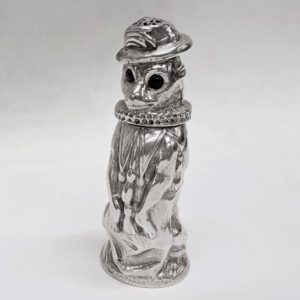
1869
Charles Stuart Harris
9353 Victorian Silver Dog Pepper
£975
A charming novelty sterling silver pepperette in the form of Punch and Judy’s dog “Toby”. Wearing his distinctive trademark bowler hat and the ruffle collar with tassles. Detachable head and glass eyes. Underneath there is a Victorian lozenge registration mark. Total weight 58 grams, just under 2 troy ounces. Height 10 cm. London 1869. Maker Charles Stuart Harris.
-

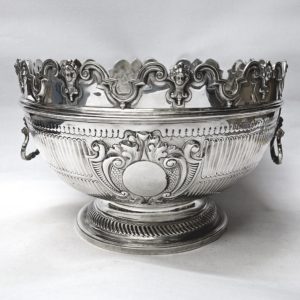
1877
Charles Stuart Harris
8849 Antique Queen Anne Style Silver Monteith Bowl
Sold
A large and handsome antique sterling punch bowl in the early 18th century style with lions mask side handles, typical ribbed body decoration and a decorative cartouche to the front. The shaped scalloped rim is detachable; this is used to hold stem glasses, punch ladle and lemon squeezer and a bowl of this type is referred to as a Monteith. Weight of silver 3426 grams, 110 troy ounces. Height 19 cms (without rim), 25 cms (with rim), diameter 37 cms. London 1877. Maker Charles Stuart Harris.
-

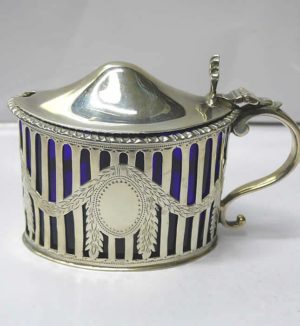
1902
Charles Stuart Harris
6323 Antique Silver Mustard Pot
Sold
Antique sterling silver mustard pot. Oval shape with pierced classical decoration and bright cut engraving. Blue glass liner. Gilt inside the lid. Weight of silver 96 grams, 3 troy ounces. Height (to top of finial) 7.25 cms. Base 7.5 x 4.5 cms. London 1902. Maker Charles Stuart Harris.
-

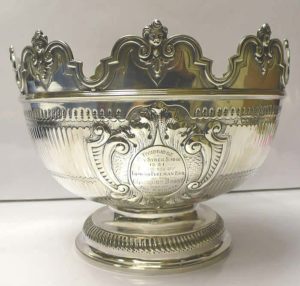
1879
Charles Stuart Harris
6448 Queen Anne Style Silver Monteith
Sold
A large antique sterling silver bowl with ribbed design and a decorative cartouche. The fixed scalloped rim is decorated with face masks. Bowls with this style of decorative rim are known as monteiths and can be used to hold stem glasses – the rims were originally detachable. Weight 1233 grams, 39.6 troy ounces. Height 21 cms. Diameter 27 cms. London 1879. Maker Charles Stuart Harris.
-

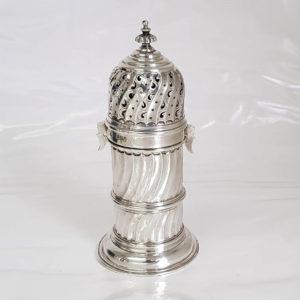
1901
Charles Stuart Harris
9962 Antique Silver Castor
Sold
An early 20th century silver muffineer in the traditional lighthouse design with a bayonet fitting, typical of the late 17th century. Britannia standard silver*. Neat size. Weight 100 grams, 3.2 troy ounces. Height 14.5cm. London 1901. Maker Charles Stuart Harris.